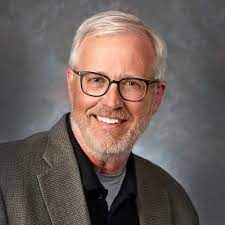By Tom Boogaart
A few years ago, an historic Reformed Church was celebrating its sesquicentennial and inviting various people to come and talk about the history and future of the Reformed tradition. I was invited to talk about the sacrament of the Lord’s Supper.
Nothing I said was new, and nothing I said was particularly shocking. I talked about how we in the Reformed tradition affirm the real presence of Jesus Christ in eating the bread and drinking the wine. I added that we Calvinists, Lutherans, and Roman Catholics, while articulating the nature of Christ’s real presence in different ways, stand together against the Anabaptists who believe that the sacrament is merely a memorial service.
I went on to say that the dramatic moment of the celebration comes when the officiant speaks these words
Send your Holy Spirit upon us, we pray,
that the bread which we break and the cup of blessing which we bless
may be to us the communion of the body and blood of Christ.
I pointed out that this was the “heavens opening” moment in the sacrament and that this hoped-for advent of the Spirit was a continuation of similar advents recorded frequently in the Bible. One thinks immediately of Jesus’ baptism by John in the Jordan: “And when he came up out of the water, immediately he saw the heavens opened and the Spirit descending upon him like a dove….” (Mark 1: 10) We read of the heavens opening for Stephen (Acts 7:56), Paul (Acts 9:3), John (Revelation 4:1), Elisha (2 Kings 2: 11), and Jacob (Genesis 28:12), to name a few.
The Bible offers us many chapters in the grand story of God coming into the world. In it there is a door between heaven and earth through which the Spirit of God descends with the blessings of heaven and through which the people of God ascend to commune with their Savior. This grand story is an advent story.
At this point in my talk things got very quiet, and I saw the long look in people’s eyes. I asked what was wrong, and a man spoke up and said: “This is hocus-pocus nonsense.” What followed was a conversation in which those gathered said that they found it very hard to imagine a world with a swinging door between heaven and earth and to imagine that Jesus Christ could really be present in the communion service and fortifying them through the bread and the wine. Anyone could see that bread was and remained bread.
I was not surprised by this reaction. I and they live in the same world. All the rituals that constitute our lives—all the manufacturing and marketing, the fevered selling and buying, the accumulation and consumption of wares—tell us that bread is bread, that the material world is all there is. Over time these rituals convince us that there is no door between heaven and earth and there is no Spirit coming to transform bread into the body of Jesus Christ and transfigure the world with the glory of God. In such world there is no advent, there is only an exit. Christians hope to leave the material world behind and commune with Jesus Christ in some sort of spiritual soul-state.
Toward the end of our hour together, a woman raised her hand and said: “I do not know how this fits into our conversation, but I want to say that there are times when I am taking communion that I feel the love of Jesus, and it carries me through the difficult days.”
Her remark gave me hope that the ritual of the Lord’s Supper has power and that it can be a means for revitalizing worship and counteracting the gross materialism of our Western culture.
Tom Boogart teaches Old Testament at Western Theological Seminary in Holland, Michigan.

